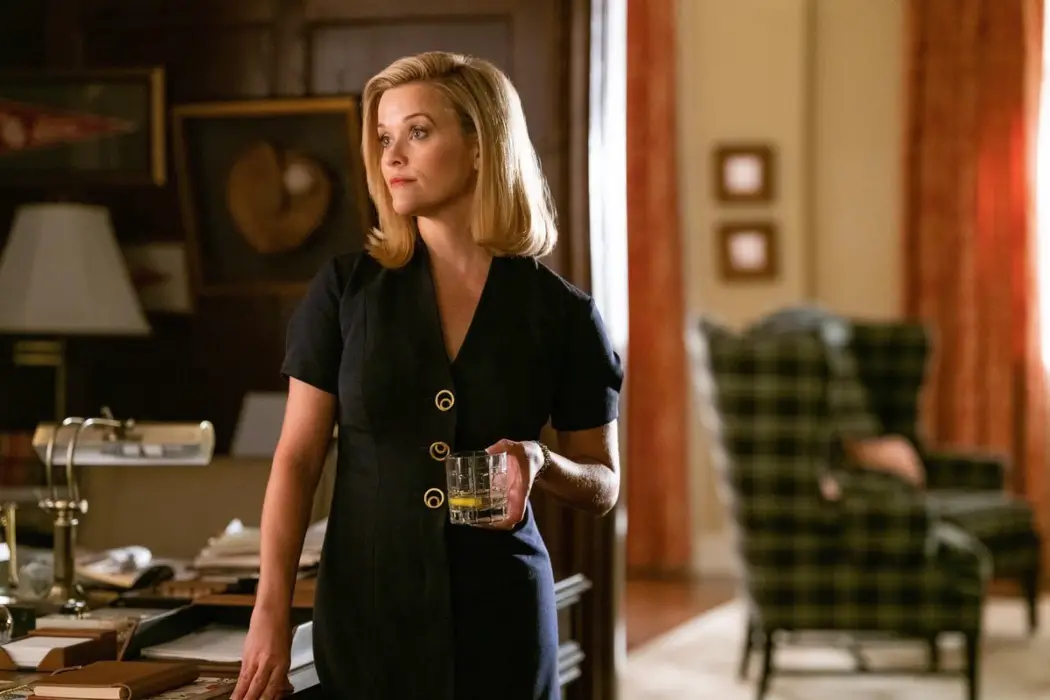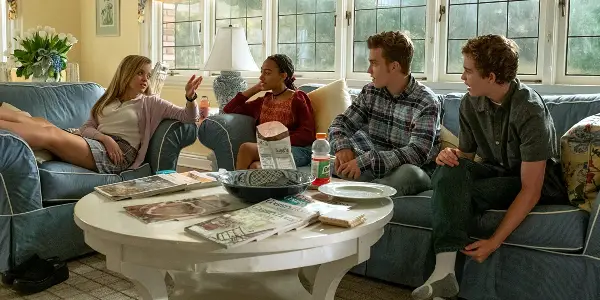LITTLE FIRES EVERYWHERE Season 1: Motherhood & Privilege Set Suburban Life On Fire

Reyzando Nawara is a passionate film and TV enthusiast from…
It’s easy to draw a comparison between Hulu’s adaptation of Celeste Ng’s bestselling novel Little Fires Everywhere and HBO’s prestige soap opera Big Little Lies. Both shows are executive-produced by and starring Reese Witherspoon as an unhinged rich lady who wants to control everything and everyone. Both shows deal with the snobbery that exists inside an upper-class suburban life. And both shows also start with its jaw-dropping endings. But where the former explores the importance and complexity of female solidarity in a patriarchal world, the latter, on the other hand, examines motherhood, race, privileges, and identity.
Naturally, all of these important subjects would’ve made Little Fires Everywhere more compelling, right? Sadly, it doesn’t, because more isn’t always equal to better. The problem is not that the show wants to tackle a lot of things at once. That, in fact, would make the show great. But throughout its eight hours, Little Fires Everywhere struggles to capture the nuance of its original source that’s needed to explore those thought-provoking topics. And as a result, what could’ve been a complex show that holds a mirror to what our society is dealing with right now, ends up reduced as another soap opera and a showcase of Witherspoon‘s talent for playing this kind of role.
A Tale of Two Mothers
Premiered on March 18, Little Fires Everywhere begins with, well, fire. And no, it’s not just metaphorically. The perfect mansion of Witherspoon‘s character, Elena Richardson, is burnt down until nothing’s left. Not long after, a cop tells Elena, who’s still in shock, that there were little fires everywhere inside the house, which means that there’s someone who purposefully intended to burn whoever was inside the house along with it. The initial question is of course who would do such a thing? But unlike Big Little Lies, who’s partly driven by the procedural element, Little Fires Everywhere never narrows its story to answer the big “who” mystery. Rather, what unfolds is the “why” and all the dramas that lead to this event.

Before her house is burnt down, Elena seems to have a perfect life and a great family. She works as a journalist in Shakers Height’s local newspaper. Her husband Bill (Joshua Jackson) is a brilliant lawyer. And her four children, Lexie (Jade Pettyjohn), Trip (Jordan Elsass), Moody (Gavin Lewis), and Izzy (Megan Stott), all seem to turn out perfect. But of course, that’s just what it seems from the outside. There’s always a tension in this house. Either it’s with her husband who demands to have sex more than what she’s already scheduled — it’s twice a week by the way — or with Izzy who wants nothing to do with her, Elena’s life is definitely far from perfect. But at least she always manages just fine at the end of the day because of her privilege as a rich, white lady.
Things begin to escalate pretty quickly when a black, free-spirited artist named Mia Warren (Kerry Washington) and her daughter Pearl (Lexie Underwood) step their foot into town. Elena, who likes to snoop around everyone else’s business, calls the cops when she sees Mia for the first time while she and her daughter are sleeping in her car, assuming that they are homeless. And this won’t be the first time Elena’s making any assumptions about Mia. In fact, throughout the whole season, Elena will keep making poor assumptions and judgments just because she can’t help it.
Elena eventually crosses path with Mia when she decides to rent out one of her houses to her. And assuming that Mia has no money, she also offers her a job as a “house manager”, which basically is just a fancier version of a maid. Though at first, Mia is reluctant, she says yes in the end after knowing that Lexie has been visiting Elena’s house. At this point, Elena thinks of herself as a nice white lady who just wants to save an unfortunate black lady. And that’s not entirely wrong. But the problem here is, she never thinks that what she did — assuming Mia as poor and someone who needs a job from her without even asking — is actually borderline racist. Mia plays along with it at first because there’s no point in confronting someone who’s oblivious of her own white privileges. But when she realizes that Lexie has changed after she keeps spending time with Elena, Mia decides that she’s had enough of it. She confronts Elena, yelling at her that she’s actually not making any good choices because all her life she’s never had any bad choices.

This, of course, sets Elena on fire, especially after realizing that her youngest child Izzy has been doing the same thing as Lexie; spending time in Mia’s house behind her back. Basically, both Lexie and Izzy are tired of their own moms and want to find someone who really knows them. Tension begins to explode, leading Elena and Mia, along with the audience, to reflect on their lives, privileges, and race. When the show dives deep into these subjects using small, reflective moments, Little Fires Everywhere is at its best. But unfortunately, most of the time, it does so without being subtle, thus making it less genuine and too on the nose.
Still, there are smaller moments that work effectively to deliver the show’s message, like when Elena invites Lexie to have dinner in her house and obliviously assumes she must have a lot of commons with Lexie’s boyfriend Brian (Stevonte Hart), just because they have the same skin color. If only the show knows how to keep things understated most of the time instead of turning it into big, explosive moments just to display Witherspoon and Washington‘s larger-than-life acting, Little Fires Everywhere would be a lot more compelling.
Undercook Custody Battle
The show’s exploration of motherhood also extends to a B-plot that involves a custody battle between Elena’s best friend Linda McCullough (Rosemarie DeWitt) and Mia’s co-worker Bebe Chow (Lu Huang), who abandoned her baby at a fire station due to economic problem. In the original book, this subplot works well to strengthen the push-and-pull relationship between Elena and Mia. But it does so without making it too dramatic. Meanwhile, Hulu’s adaptation does the complete opposite; making this courtroom drama as the biggest dramatic impulse, thus resulting in the already-unsubtle show to lose more of its nuanced moment.
Given the fact that Little Fires Everywhere has a lot of thought-provoking ideas beneath all the melodramas, it’s honestly quite a disappointment to see it stumbles easily just because it wants to be big. There’s a challenging question of what qualifies someone to be a good mother; is it a woman who has all the money in the world and can provide a child with everything? Or is it simply just bloodline and love? But Little Fires Everywhere never quite ponders that question even deeper because the courtroom drama is mostly just there to tighten the tension between Elena and Mia instead of fully exploring Bebe and Linda.

Of course, Little Fires Everywhere is Mia and Elena’s story. They are, after all, the lead characters, the two people who are supposed to be the proxy of all the themes that the story wants to tackle in the first place. But for most parts, the show never allows either Mia or Elena’s action to fight for Bebe and Linda as a reflection of their idealism on what a good mother is. Instead, what both these characters do throughout the season looks just like a punishment they give to each other for spending time with each of their own children when they couldn’t, not because they refuse to have their idealism proven wrong.
The Fires Go Out Quickly
There’s a lot of missteps on the show that make its fires go out quickly. From its aggressive ambitions to tackle a lot of things to its unsubtle and heavy-handed melodrama approach, Little Fires Everywhere obviously suffers from most of it. But one thing that at least makes the journey worthwhile is the performances. Witherspoon and Washington have plenty of Emmy-worthy moments. DeWitt‘s performance is also phenomenal despite brief screen-time. The MVP, however, is newcomer Megan Stott, whose emotional display throughout the season is always on-point. Too bad it’s not enough to keep the fires going.
What do you think of the ending? Let us know in the comments!
All episodes of Little Fires Everywhere are available to stream on Hulu.
https://www.youtube.com/watch?v=JWGkX8ClhBI
https://www.youtube.com/watch?v=JWGkX8ClhBI
Does content like this matter to you?
Become a Member and support film journalism. Unlock access to all of Film Inquiry`s great articles. Join a community of like-minded readers who are passionate about cinema - get access to our private members Network, give back to independent filmmakers, and more.
Reyzando Nawara is a passionate film and TV enthusiast from Indonesia. When he's not watching TV and movies, he likes to cook and make sorbet.













